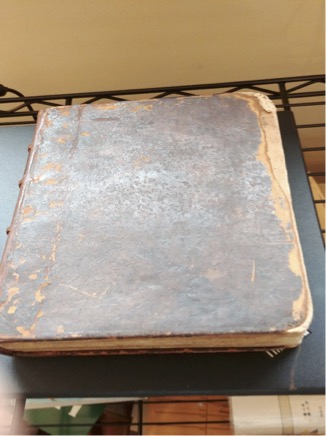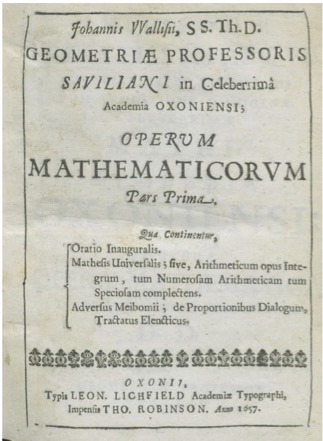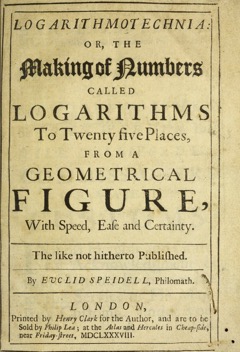- About MAA
- Membership
- MAA Publications
- Periodicals
- Blogs
- MAA Book Series
- MAA Press (an imprint of the AMS)
- MAA Notes
- MAA Reviews
- Mathematical Communication
- Information for Libraries
- Author Resources
- Advertise with MAA
- Meetings
- Competitions
- Programs
- Communities
- MAA Sections
- SIGMAA
- MAA Connect
- Students
- MAA Awards
- Awards Booklets
- Writing Awards
- Teaching Awards
- Service Awards
- Research Awards
- Lecture Awards
- Putnam Competition Individual and Team Winners
- D. E. Shaw Group AMC 8 Awards & Certificates
- Maryam Mirzakhani AMC 10 A Awards & Certificates
- Two Sigma AMC 10 B Awards & Certificates
- Jane Street AMC 12 A Awards & Certificates
- Akamai AMC 12 B Awards & Certificates
- High School Teachers
- News
You are here
Mathematical Treasure: John Wallis’s Operum Mathematicorum Pars Prima
Englishman John Wallis (1616–1703) worked off and on as a chaplain—despite being independently wealthy from the age of 27—but he is best known today for his accomplishments in mathematics. During the English Civil War, he did cryptography on behalf of the Parliamentarians. Oliver Cromwell appointed Wallis to the Savilian Chair of Geometry at Oxford University in 1649, where he remained until his death and through numerous regime changes. He contributed ideas necessary for the invention of calculus, including solutions for specific infinite series, notation such as ∞ to represent infinity and 1/∞ to represent an infinitesimal quantity, and an analytic treatment of conic sections.
Although he had already published two major works in his time at Oxford, De Sectionibus Conicis (1655) and Arithmetica Infinitorum (1656), it was only in 1657 that Wallis published his inaugural address as Savilian Professor. The volume also contained Mathesis Universalis, written versions of his lectures, and a dialogue on proportions. The binding and title page of the copy owned by the author appear below.


This copy of the book was owned by Euclid Speidell (d. 1702; see the inscription below: Euclid Speidell 23 May 1692).

The son of an English mathematics teacher who was an early adopter of logarithms, Speidell also offered his services as a teacher as well as worked as a customs official. His most famous original book was the 1688 Logarithmotechnia, or, The making of numbers called logarithms to twenty five places from a geometrical figure.

A full digitization of Speidell's work is available in the Internet Archive, which also has a full digitization of Operum Mathematicorum. In addition to the works linked above, Wallis’s 1676 Latin translations of Archimedes’ Sand Reckoner and On the Measurement of a Circle, 1685 Treatise of Algebra, and collected works (second copy) can be found in Mathematical Treasures.
Index to Mathematical Treasures
Sidney J. Kolpas (Delaware County Community College), "Mathematical Treasure: John Wallis’s Operum Mathematicorum Pars Prima ," Convergence (June 2022)




